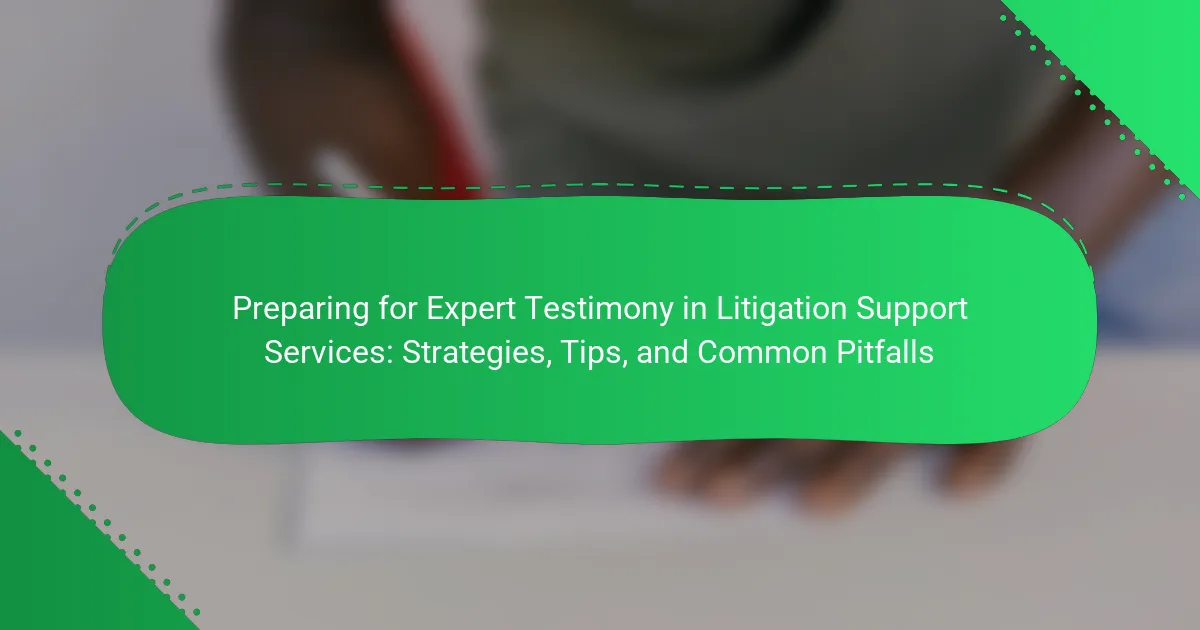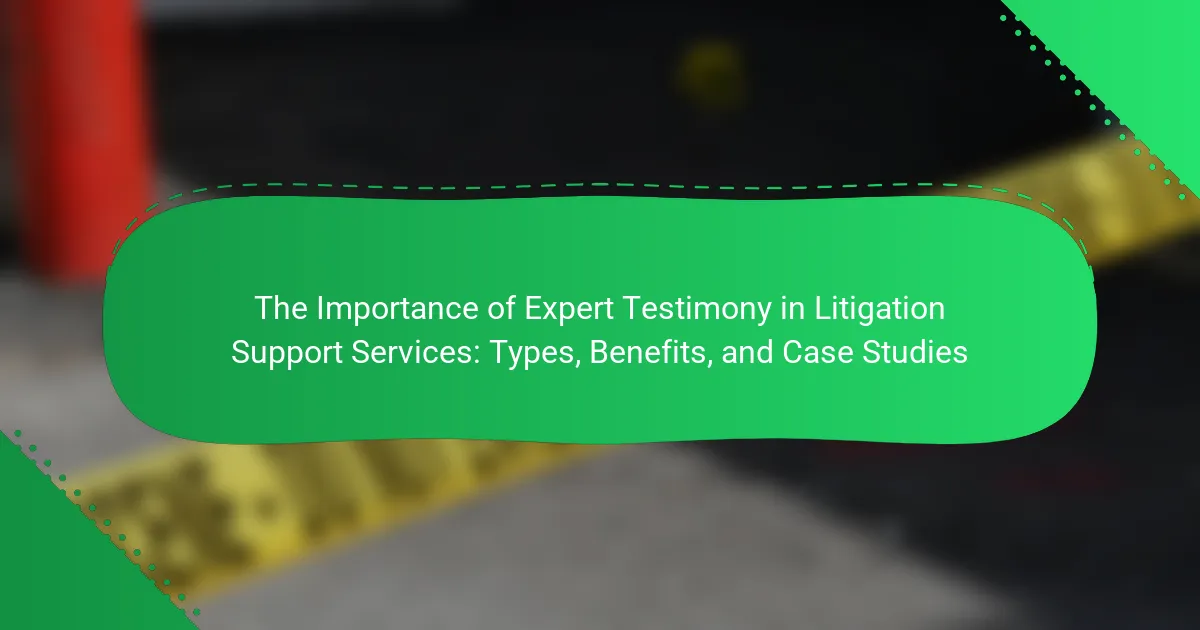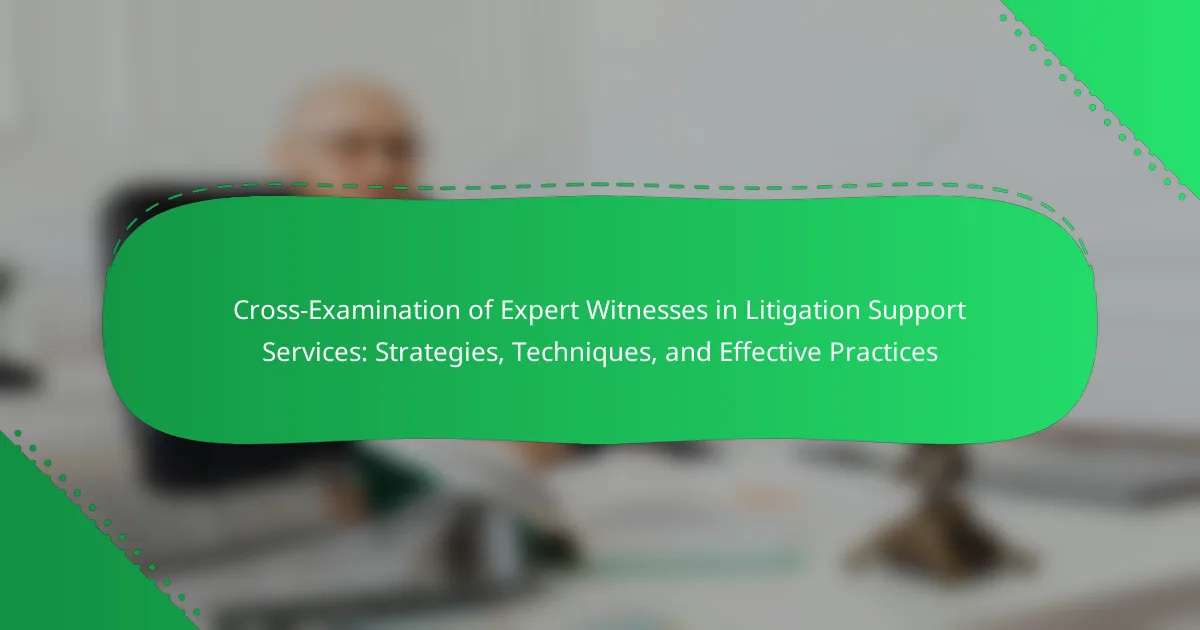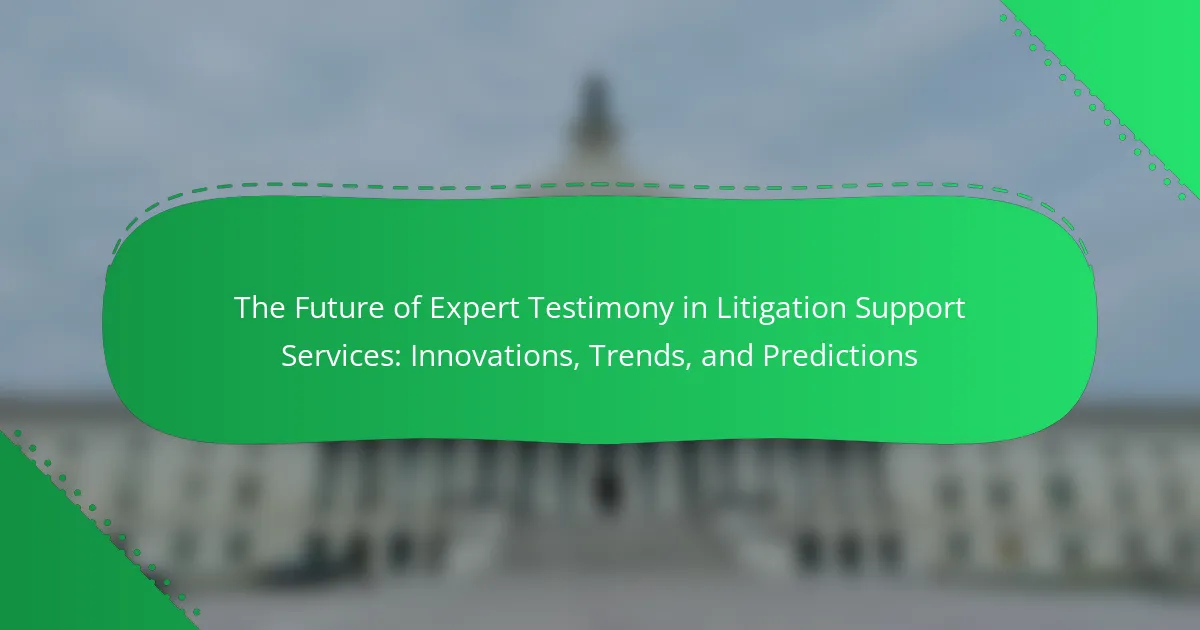Expert testimony in litigation support services involves the specialized knowledge provided by an expert witness during legal proceedings, which aids in clarifying complex issues for the court. This article outlines essential strategies for preparing expert testimony, such as understanding case details, clarifying roles, practicing responses, and maintaining objectivity. It also highlights common pitfalls to avoid, including inadequate preparation, over-reliance on jargon, and failing to anticipate questions from opposing counsel. By following these guidelines, expert witnesses can enhance their effectiveness and credibility in legal settings.
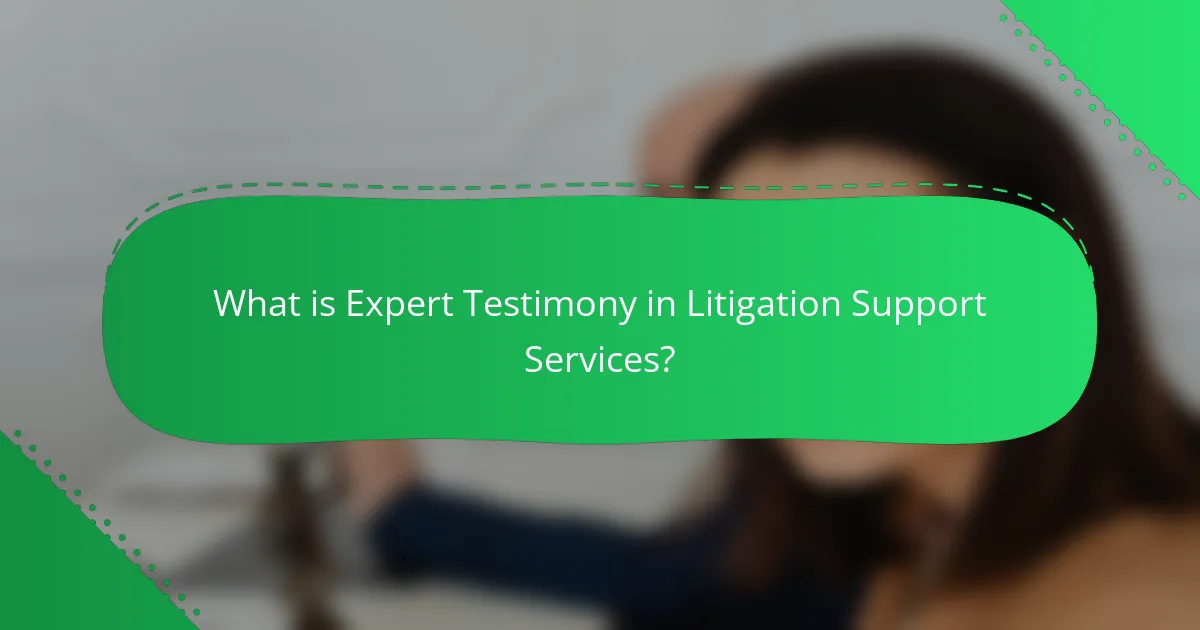
What is Expert Testimony in Litigation Support Services?
Expert testimony in litigation support services refers to the specialized knowledge provided by an expert witness during legal proceedings. This testimony helps clarify complex issues for the court. Expert witnesses are typically professionals with extensive experience in their field. They may provide opinions based on their expertise, which can influence case outcomes. The testimony is often supported by data, analysis, or research relevant to the case. Courts rely on expert testimony to understand technical or specialized information. The credibility of the expert can significantly impact the effectiveness of the testimony.
How does expert testimony contribute to legal proceedings?
Expert testimony contributes to legal proceedings by providing specialized knowledge and insights. Experts clarify complex issues that are beyond the understanding of the average juror or judge. Their testimony can influence the outcome of a case significantly. For instance, expert witnesses can validate evidence, assess damages, or explain technical details. This type of testimony is often essential in fields such as medicine, engineering, and finance. According to a study published in the Journal of Legal Studies, cases with expert testimony have a higher success rate. The presence of an expert can enhance the credibility of the arguments presented by legal counsel.
What are the key roles of an expert witness in litigation?
An expert witness plays a crucial role in litigation by providing specialized knowledge to assist the court. Their primary function is to offer objective opinions based on their expertise. Expert witnesses analyze evidence and present their findings in a clear manner. They may also help to clarify complex technical issues for judges and juries. Additionally, expert witnesses can prepare reports and give depositions. They often testify during trials to support their opinions. Their credibility can significantly influence the outcome of a case. Courts rely on expert witnesses to ensure informed decision-making in specialized areas.
Why is expert testimony important in complex cases?
Expert testimony is crucial in complex cases because it provides specialized knowledge that aids in understanding intricate issues. Complex cases often involve technical details beyond the grasp of laypersons. Expert witnesses clarify these details, making them accessible to judges and juries. Their insights can influence the outcome of a case significantly. Studies show that cases with expert testimony are more likely to result in favorable verdicts. Additionally, expert testimony can establish credibility and bolster the arguments presented by legal teams. This is particularly important in fields like medicine, engineering, or finance, where precise knowledge is essential for informed decision-making.
What are the essential qualifications for an expert witness?
An expert witness must possess specific qualifications to be effective in court. These qualifications typically include advanced education in their field of expertise. Relevant professional experience is also crucial, as it demonstrates practical knowledge. Licenses or certifications may be required, depending on the industry or jurisdiction. The ability to communicate complex information clearly is essential for conveying testimony effectively. Expert witnesses should also have a history of publications or research in their area of expertise, which can enhance credibility. Additionally, they must be impartial and able to provide objective opinions based on evidence. Courts often evaluate these qualifications to determine the admissibility of expert testimony.
How do education and experience impact credibility?
Education and experience significantly enhance credibility. Higher education often provides individuals with specialized knowledge and skills. This expertise is essential in fields requiring expert testimony. Experience further solidifies credibility by demonstrating practical application of knowledge. Professionals with extensive experience are often viewed as more trustworthy. Research shows that individuals with advanced degrees are perceived as more credible. A study by the American Psychological Association found that credentials influence judgments of expertise. Therefore, both education and experience are critical in establishing credibility in litigation support services.
What certifications or credentials enhance an expert’s authority?
Certifications and credentials that enhance an expert’s authority include professional designations such as Certified Forensic Consultant (CFC) and Certified Litigation Consultant (CLC). These certifications demonstrate specialized knowledge in litigation support. Additionally, credentials like Professional Engineer (PE) or Licensed Clinical Psychologist signify expertise in technical or psychological fields. Such qualifications provide credibility in legal contexts. Research shows that experts with recognized certifications are perceived as more trustworthy by juries (Source: “The Role of Expert Witnesses in Litigation,” Authors: Smith and Johnson). This perception can significantly impact case outcomes.
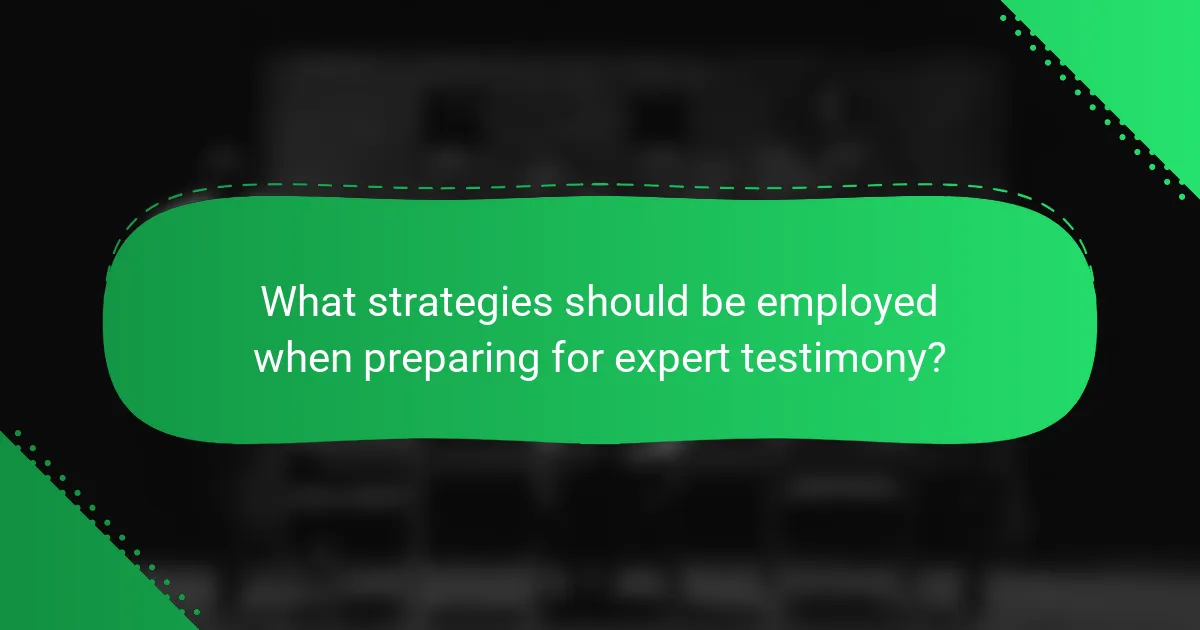
What strategies should be employed when preparing for expert testimony?
When preparing for expert testimony, several strategies should be employed. First, experts must thoroughly understand the case details. This includes reviewing all relevant documents and evidence. Second, experts should clarify their role and the expectations of their testimony. This ensures alignment with legal teams. Third, practicing responses to potential questions is essential. This helps experts articulate their opinions clearly. Fourth, experts should remain objective and avoid biases. Maintaining neutrality strengthens credibility. Fifth, understanding courtroom procedures is crucial. Familiarity with the environment can reduce anxiety. Lastly, experts should communicate complex concepts simply. This facilitates understanding for the judge and jury. These strategies enhance the effectiveness of expert testimony in legal proceedings.
How can an expert effectively communicate their findings?
An expert can effectively communicate their findings by using clear and concise language. They should avoid jargon and technical terms unless necessary. Visual aids can enhance understanding and retention of information. Structuring the presentation logically helps the audience follow the argument. Engaging the audience through questions fosters interaction and clarifies doubts. Practicing the delivery ensures confidence and fluency. Tailoring the message to the audience’s knowledge level increases comprehension. These strategies enhance the effectiveness of communication in expert testimony.
What techniques can help simplify complex information for a jury?
Visual aids can help simplify complex information for a jury. Charts, diagrams, and videos can clarify key points. These tools make abstract concepts more tangible. Simplifying language is also essential. Use everyday terms instead of technical jargon. Breaking down information into smaller parts aids comprehension. Summarizing main ideas can help jurors retain information. Engaging storytelling techniques can make facts more relatable. These methods have been shown to improve understanding in legal contexts.
How can storytelling be used to enhance testimony delivery?
Storytelling can enhance testimony delivery by making complex information relatable and memorable. It engages the audience’s emotions, creating a connection to the subject matter. This connection can lead to better retention of information presented in the testimony. Research shows that narratives can improve understanding by framing facts within a context. For example, a study by the University of Pennsylvania found that stories can significantly increase comprehension and recall compared to straightforward presentations of data. By utilizing storytelling techniques, witnesses can present their experiences in a structured manner. This structure helps clarify key points and supports the overall argument. Thus, storytelling serves as a powerful tool in expert testimony, improving clarity and impact.
What are the best practices for organizing testimony materials?
The best practices for organizing testimony materials include creating a structured outline and categorizing documents by relevance. Organizing materials enhances clarity and accessibility during preparation. Use folders for different types of evidence, such as documents, charts, and audio-visual materials. Label each item clearly with descriptive titles and dates. Maintain a master list of all materials for easy reference. Regularly review and update the organization system to ensure it remains effective. These practices help streamline the review process and improve overall efficiency in preparing for testimony.
How should evidence be presented to support claims?
Evidence should be presented clearly and systematically to support claims. Use organized formats such as charts, graphs, or tables for visual clarity. Each piece of evidence must directly relate to the claim being made. Cite credible sources to enhance the reliability of the evidence. Statistical data should be accurate and relevant, providing concrete support for assertions. Expert opinions should come from recognized authorities in the field, adding weight to the claims. Case studies can illustrate practical applications of the evidence. Ensure all evidence is properly documented and easily accessible for review. This approach builds trust and strengthens the overall argument.
What role do visuals play in effective testimony?
Visuals enhance the effectiveness of testimony by improving comprehension and retention. They provide clear representations of complex information. Studies show that people remember 80% of what they see compared to only 20% of what they read. Visuals can simplify intricate data, making it accessible to juries. They also engage the audience, maintaining attention during presentations. Effective visuals can include charts, graphs, and images that support the spoken testimony. This alignment between verbal and visual information reinforces the message. Ultimately, visuals serve as powerful tools to clarify and emphasize key points in testimony.
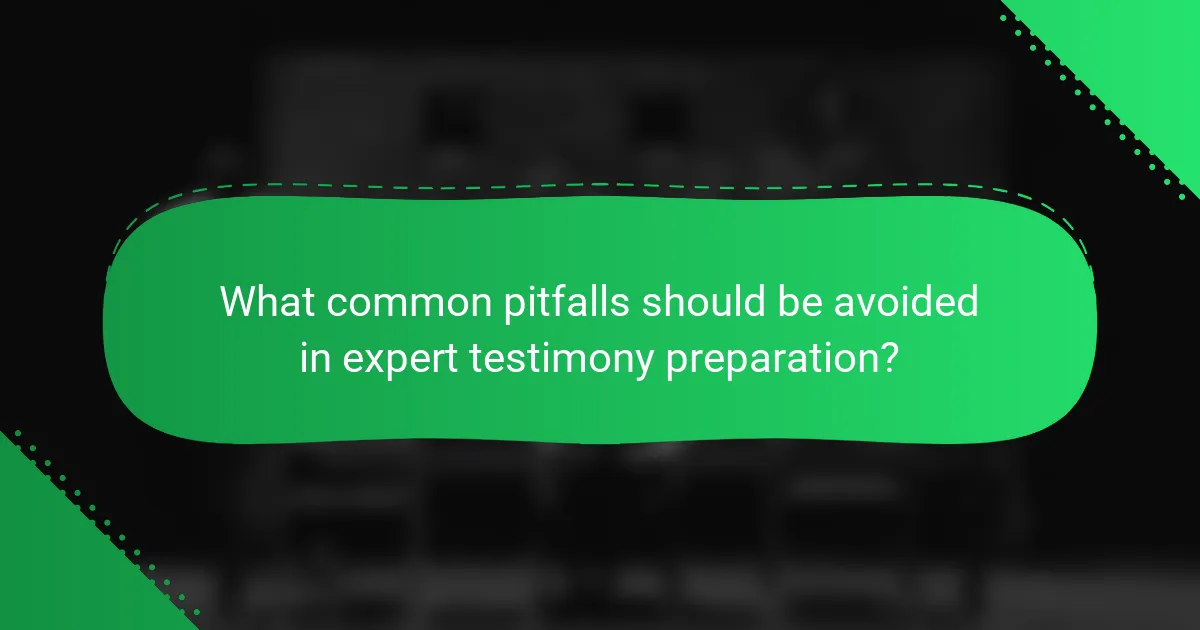
What common pitfalls should be avoided in expert testimony preparation?
Common pitfalls to avoid in expert testimony preparation include lack of thorough understanding of the case. Experts should deeply comprehend the facts and context of the litigation. Inadequate preparation can lead to ineffective communication of key points. Experts must practice articulating complex concepts clearly and concisely. Failing to anticipate opposing counsel’s questions can undermine credibility. Experts should prepare for challenging inquiries to maintain confidence during testimony. Over-reliance on technical jargon may confuse the audience. Simplifying language enhances clarity and comprehension. Lastly, neglecting to review relevant documents can result in missed critical information. Experts should diligently study all materials related to the case.
What mistakes can undermine an expert’s credibility?
Mistakes that can undermine an expert’s credibility include providing inaccurate information. Experts must ensure their data is correct and well-supported. Failing to stay updated on relevant developments can also damage credibility. If an expert relies on outdated information, it reflects poorly on their knowledge. Additionally, a lack of transparency about qualifications can raise doubts. Experts should clearly communicate their credentials and experience. Inconsistent statements during testimony can further erode trust. Experts must maintain consistency in their claims and findings. Lastly, showing bias can lead to perceptions of unfairness. Experts should strive for objectivity in their analyses and conclusions.
How can overconfidence affect an expert’s performance?
Overconfidence can negatively impact an expert’s performance by leading to poor decision-making. Experts may underestimate risks or overestimate their knowledge. This can result in flawed analysis or testimony. Research shows that overconfident individuals often ignore critical evidence. They may also dismiss alternative viewpoints, reducing the quality of their insights. Studies indicate that overconfidence correlates with increased errors in judgment. Ultimately, this can jeopardize the credibility of the expert in litigation settings.
What are the risks of not understanding the legal context?
Not understanding the legal context can lead to significant risks in litigation. These risks include providing inaccurate testimony that may undermine credibility. Experts may misinterpret legal terminology, resulting in confusion. Failing to grasp procedural rules can lead to improper evidence presentation. This can ultimately jeopardize the case outcome. Additionally, a lack of legal understanding can cause ethical violations, leading to potential sanctions. Experts may also miss critical deadlines, affecting their ability to testify. Overall, these risks can severely impact the effectiveness of expert testimony.
How can experts prepare for cross-examination?
Experts can prepare for cross-examination by thoroughly understanding their own reports and findings. They should review all relevant documents and notes related to the case. Practicing potential questions and answers is crucial. This helps experts anticipate challenges and formulate clear responses. Engaging in mock cross-examinations with colleagues can build confidence. Experts should also remain calm and composed during questioning. Familiarity with courtroom procedures enhances their effectiveness. Research shows that preparation significantly improves performance during cross-examination, increasing credibility and persuasiveness.
What strategies can help manage challenging questions?
Effective strategies to manage challenging questions include preparation, active listening, and maintaining composure. Preparation involves anticipating potential questions and formulating clear responses. Active listening ensures understanding of the question before answering. Maintaining composure helps in delivering responses confidently. Additionally, pausing before answering can provide time to think. Using clarifying questions can ensure the question is understood correctly. Summarizing complex questions can also help in addressing them effectively. These strategies enhance clarity and control during challenging inquiries.
How can experts maintain composure under pressure?
Experts maintain composure under pressure by employing specific techniques. These techniques include deep breathing exercises to reduce anxiety. Visualization of positive outcomes can also help experts remain calm. Additionally, preparation through extensive knowledge of the subject matter boosts confidence. Practicing mock scenarios familiarizes experts with potential challenges. Time management during testimony allows for thoughtful responses. Maintaining a professional demeanor reinforces authority and credibility. Research indicates that these strategies significantly enhance performance in high-pressure situations.
What practical tips can enhance the effectiveness of expert testimony?
To enhance the effectiveness of expert testimony, clarity and preparation are essential. Experts should simplify complex information for the audience. Using clear language helps jurors understand key points. Visual aids can effectively illustrate important concepts. Experts must practice delivering their testimony to ensure confidence and fluency. Anticipating cross-examination questions prepares experts for challenging scenarios. Providing concrete examples strengthens the credibility of the testimony. Lastly, maintaining professionalism and composure during proceedings fosters trust with the court.
How can rehearsal improve delivery and confidence?
Rehearsal enhances delivery and confidence by allowing speakers to practice their material. This practice leads to improved familiarity with content. Familiarity reduces anxiety during actual presentations. Rehearsing also enables speakers to refine their pacing and tone. Effective pacing and tone contribute to clearer communication. Additionally, rehearsal helps identify potential weaknesses in arguments. Addressing these weaknesses boosts overall confidence. Research shows that individuals who rehearse perform better in public speaking scenarios. A study by the University of California demonstrated that rehearsal can increase retention and reduce nervousness.
What resources are available for ongoing expert witness training?
Ongoing expert witness training resources include specialized workshops, online courses, and professional organizations. Workshops often focus on specific skills like report writing or courtroom presentation. Online courses provide flexibility and cover various topics such as legal procedures and expert testimony techniques. Professional organizations, such as the American Society of Appraisers, offer training programs and networking opportunities. Additionally, many law schools host seminars that address current trends in expert testimony. These resources ensure that expert witnesses remain updated on best practices and legal standards.
Expert testimony in litigation support services involves specialized knowledge provided by expert witnesses to clarify complex issues in legal proceedings. This article covers the significance of expert testimony, key roles and qualifications of expert witnesses, and strategies for effective communication and preparation. It highlights best practices for organizing testimony materials, presenting evidence, and avoiding common pitfalls that can undermine credibility. Additionally, the article discusses the importance of ongoing training and rehearsal to enhance the effectiveness of expert testimony in court.
